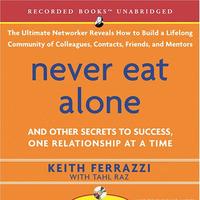7. CHAPTER 1 - Self-Help: A Misnomer
But my supervisors, with whom I had already developed relationships and who were aware of all my extracurricular activities, had another idea.
Together, we cooked up a job description that previously did not exist at the company. My mentors gave me a $150,000 expense account to do what I had already been doing: developing business, representing the firm with speaking engagements, and reaching out to the press and business world in ways that would strengthen Deloitte's presence in the marketplace.
My supervisors' belief in me paid off. Within a year, the company's brand recognition in the line of business on which I focused (reengineering) moved from bottom of the consulting pack to one of the top of the industry, achieving a growth rate the company had never known (though, of course, it wasn't all my doing). I went on to become the company's chief marketing officer and the youngest person ever tapped for partner. And I was having a blast—the work was fun, exciting, interesting. Everything you could want in a job. While my career was in full throttle, in some ways it all seemed like a lucky accident.
In fact, for many years, I couldn't see exactly where my professional trajectory would take me—after Deloitte, a crazy quilt of top-level jobs culminating in my founding my own company. It's only today, looking in the rearview mirror, that it makes enormous sense. From Deloitte, I became the youngest chief marketing officer in the Fortune 500 at Starwood Hotel & Resorts. Then I went on to become CEO of a Knowledge Universe (Michael Milken)- funded video game company, and now, founder of my own company, Ferrazzi Greenlight, a sales and marketing consulting and training firm to scores of the most prestigious brands, and an advisor to CEOs across the world. I zigged and zagged my way to the top. Every time I contemplated a move or needed advice, I turned to the circle of friends I had created around me. At first I tried to draw attention away from my people skills for fear that they were somehow inferior to other more "respectable" business abilities.
But as I got older, everyone from well-known CEOs and politicians to college kids and my own employees came to me asking for advice on how to do those things I had always loved doing. Crain's magazine listed me as one of the forty top business leaders under forty, and the World Economic Forum labeled me as a "Global Leader of Tomorrow." Senator Hillary Clinton asked me to use my connecting skills to raise money for her favorite nonprofit organization, Save America's Treasures. Friends and CEOs of Fortune 500 companies asked if I could help them throw more intimate dinner parties for their lead prospects and clients in key regions of the country. MBA students sent me e-mails hungry to learn the people skills their business schools weren't teaching them. Those turned into formal training courses now taught at the most prestigious MBA programs in America. The underlying "softer" skills I used to arrive at my success, I learned, were something others could benefit from learning.
Of course, building a web of relationships isn't the only thing you need to be successful.
But building a career, and a life, with the help and support of friends and family and associates has some incredible virtues.

